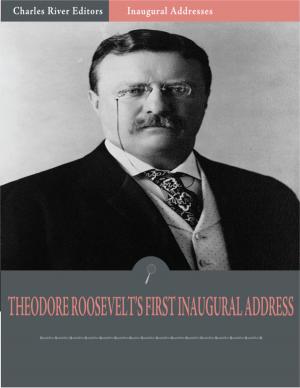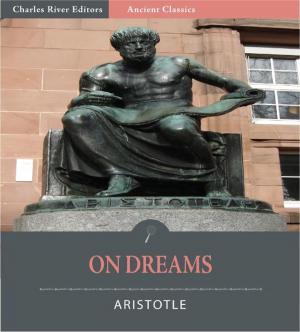Sigmund Freud: The Life and Legacy of History's Most Famous Psychiatrist
Nonfiction, Health & Well Being, Medical, Specialties, Psychiatry, Biography & Memoir, Reference| Author: | Charles River Editors | ISBN: | 9781475322620 |
| Publisher: | Charles River Editors | Publication: | March 9, 2013 |
| Imprint: | Language: | English |
| Author: | Charles River Editors |
| ISBN: | 9781475322620 |
| Publisher: | Charles River Editors |
| Publication: | March 9, 2013 |
| Imprint: | |
| Language: | English |
Includes pictures of Freud and important people and places in his life.Discusses Freud's theories and criticism of them.Includes some of Freud's most famous quotes and a bibliography of his major works.Includes a Table of Contents."Only for the most select and most balanced minds does it seem possible to guard the perceived picture of external reality against the distortion to which it is otherwise subjected in its transit through the psychic individuality of the one perceiving it." - Sigmund FreudSigmund Freud (1856-1939) is known around the world as the "Father of Psychoanalysis," and for good reason. If anything, Freud's first patient was himself. A sufferer of psychosomatic symptoms, Freud diagnosed himself as having a repressed antagonism against his father. From there, Freud began to build on his now famous concepts of the unconscious, infantile sexuality and repression. And of course, there's his famous theory on the structure of the mind, which has made Id and Ego a commonly used part of the English lexicon. In addition to all but creating a new field of science, Freud also contributed to entire industries. One of the first to try to analyze dreams, Freud's work has led patients in search of psychological explanations for various physical and mental symptoms and phenomena. The Interpretation of Dreams is Sigmund Freud's best known work, focusing on his theory of the unconscious with respect to dream interpretation. To Freud, dreams represented the unconscious attempt to fulfill some sort of wish, either by resolving a conflict or bringing certain memories to the surface.And as a practitioner for many years, Freud wrote voluminously about his theories during the early 20th century, and his work tied in to a countless number of aspects concerning life and the mind. Whether he was analyzing why people find things funny (Wit and Its Relation to the Unconscious), what causes hysteria and delusions (Delusion and Dream), death (Beyond the Pleasure Principle), and seemingly everything inbetween. As a result, Freud remains one of the most influential and famous thinkers and psychologists of the 20th century.Sigmund Freud: The Life and Legacy of History's Most Famous Psychiatrist profiles the amazing life and works of the influential thinker, examining is theories and analyzing his lasting legacy. Along with pictures of important people, places, and events, you will learn about Freud like you never have before, in no time at all.
Includes pictures of Freud and important people and places in his life.Discusses Freud's theories and criticism of them.Includes some of Freud's most famous quotes and a bibliography of his major works.Includes a Table of Contents."Only for the most select and most balanced minds does it seem possible to guard the perceived picture of external reality against the distortion to which it is otherwise subjected in its transit through the psychic individuality of the one perceiving it." - Sigmund FreudSigmund Freud (1856-1939) is known around the world as the "Father of Psychoanalysis," and for good reason. If anything, Freud's first patient was himself. A sufferer of psychosomatic symptoms, Freud diagnosed himself as having a repressed antagonism against his father. From there, Freud began to build on his now famous concepts of the unconscious, infantile sexuality and repression. And of course, there's his famous theory on the structure of the mind, which has made Id and Ego a commonly used part of the English lexicon. In addition to all but creating a new field of science, Freud also contributed to entire industries. One of the first to try to analyze dreams, Freud's work has led patients in search of psychological explanations for various physical and mental symptoms and phenomena. The Interpretation of Dreams is Sigmund Freud's best known work, focusing on his theory of the unconscious with respect to dream interpretation. To Freud, dreams represented the unconscious attempt to fulfill some sort of wish, either by resolving a conflict or bringing certain memories to the surface.And as a practitioner for many years, Freud wrote voluminously about his theories during the early 20th century, and his work tied in to a countless number of aspects concerning life and the mind. Whether he was analyzing why people find things funny (Wit and Its Relation to the Unconscious), what causes hysteria and delusions (Delusion and Dream), death (Beyond the Pleasure Principle), and seemingly everything inbetween. As a result, Freud remains one of the most influential and famous thinkers and psychologists of the 20th century.Sigmund Freud: The Life and Legacy of History's Most Famous Psychiatrist profiles the amazing life and works of the influential thinker, examining is theories and analyzing his lasting legacy. Along with pictures of important people, places, and events, you will learn about Freud like you never have before, in no time at all.















